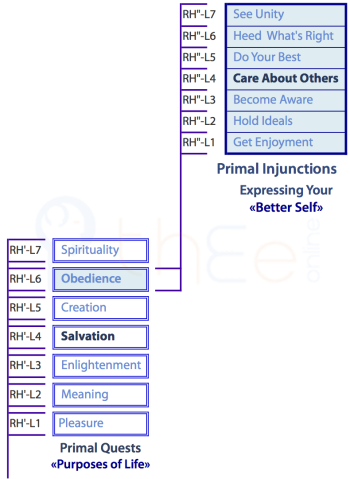Care About Others: RH"L4
Quest → Injunction

The Salvation Quest is about giving selfless aid to those in danger and clearly in need of immediate assistance. Providing direct assistance to the needy in urgent and often life-threatening situations is clearly not for everyone. However, we all need others, in good times and in bad. At any particular moment we may have a need for company, for approval, for encouragement, for respect, for sympathy, for a loan, for practical advice, for silence and so on.
Exactly what you should do to aid another person is often obscure. But everyone should cultivate a willingness and capacity to —not as an instrument or a faceless statistic. Treating someone as a number or as a piece of meat can creep up on anyone, especially when under pressure in a transactional society. So the is simply to «».
You are enjoined to maintain human contact and to with whom you deal or whom you affect directly and indirectly.
How is shown will vary according to your personal situation, social values, and the nature of the relationship. For family, caring may be intense, with intimacy, targeted kindness and overt affection. For a customer, it may be a better service or relevant accurate advice or a fair arrangement. For a stranger in the street, it may mean showing civility and good manners. For a malaria sufferer or victim of torture on the other side of the world, caring will necessarily be rather limited and unfocused (e.g. signing a petition, donating to an aid agency).
Potential Misconceptions
- has nothing whatsoever to do with demanding bureaucratic welfare arrangements and supporting social policies to benefit the needy.
- Being charitable is part of ; but working for a charity or giving to charity is not obligatory. There are cogent arguments and evidence that much charitable giving is ineffective or counter-productive, or at least sub-optimal.
- It may not always be evident that is occurring. Some «tough love» responses may seem harsh but be appropriately caring. Conversely, some apparent caring is actually parasitic and reflects manipulative relating.
- which is hypocritical and exploitative reflects the evil released by a complete rejection of this . For those on the receiving end of such handling, the to would apply.
Why is it So Hard?
is hard because genuinely relating to another, transiently, briefly or over many years, may be hard. Instead of , it can be much easier and less troublesome to substitute relationships based on habit, convention, superficiality, self-satisfying charm, or passive tolerance.
When it comes to the needs of others, it is rather easy to put your own needs first and to over-estimate your own importance. The end result of that way of thinking is to convert relating into transacting, and eventually to stop noticing that others have needs or are human beings with feelings.
can feel and seem genuine, when in fact the caring is narcissistic. A person projects a needy aspect of themselves into another (or others, often sequentially) and then attempts to care for themselves through caring for the other. This is a game because the other can never get better: if they did then they would no longer be a suitable vehicle for the projection of neediness. Another willing victim would be sought.
- Next : do your best.
Originally posted:16-Nov-2012